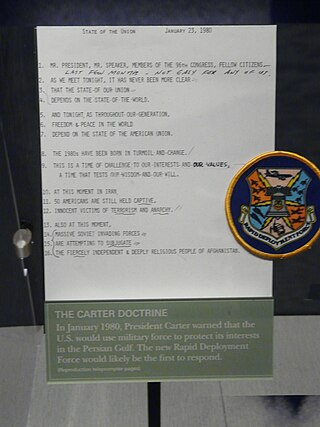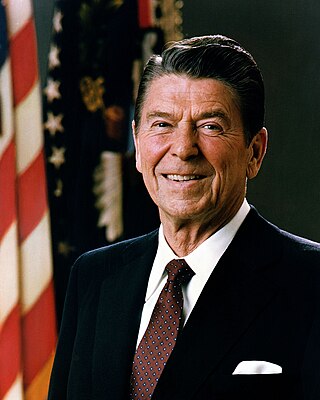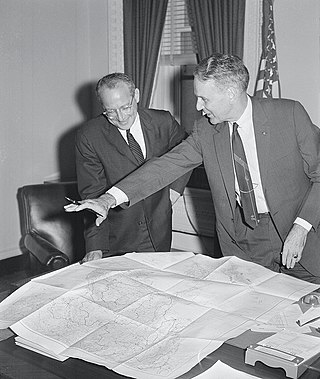
Colin Luther Powell was an American politician, statesman, diplomat, and United States Army officer who was the 65th United States secretary of state from 2001 to 2005. He was the first African American secretary of state. He was the 15th United States national security advisor from 1987 to 1989, and the 12th chairman of the Joint Chiefs of Staff from 1989 to 1993.

The Carter Doctrine was a policy proclaimed by President of the United States Jimmy Carter in his State of the Union Address on January 23, 1980, which stated that the United States would use military force, if necessary, to defend its national interests in the Persian Gulf. It was a response to the Soviet Union's intervention in Afghanistan in 1979, and it was intended to deter the Soviet Union, the United States' Cold War adversary, from seeking hegemony in the Persian Gulf region.

The Reagan Doctrine was stated by United States President Ronald Reagan in his State of the Union address on February 6, 1985: "We must not break faith with those who are risking their lives—on every continent from Afghanistan to Nicaragua—to defy Soviet-supported aggression and secure rights which have been ours from birth." It was a strategy implemented by the Reagan Administration to overwhelm the global influence of the Soviet Union in the late Cold War. The doctrine was a centerpiece of United States foreign policy from the early 1980s until the end of the Cold War in 1991.

The "Powell Doctrine" is a journalist-created term, named after General Colin Powell, for a doctrine that Powell created in the run-up to the 1990–1991 Gulf War. The doctrine poses questions emphasizing national security interests, overwhelming strike capabilities with an emphasis on ground forces, and widespread public support, all of which have to be answered affirmatively before military action is taken. Powell's doctrine is based in large part on the Weinberger Doctrine, devised by Caspar Weinberger during his tenure as Secretary of Defense.

The United States invasion of Grenada began at dawn on 25 October 1983. The United States and a coalition of six Caribbean nations invaded the island nation of Grenada, 100 miles (160 km) north of Venezuela. Codenamed Operation Urgent Fury by the U.S. military, it resulted in military occupation within a few days. It was triggered by the strife within the People's Revolutionary Government, which resulted in the house arrest and execution of the previous leader and second Prime Minister of Grenada, Maurice Bishop, and the establishment of the Revolutionary Military Council, with Hudson Austin as Chairman. The invasion resulted in the appointment of an interim government, followed by elections in 1984.

The history of the United States from 1980 until 1991 includes the last year of the Jimmy Carter presidency, eight years of the Ronald Reagan administration, and the first three years of the George H. W. Bush presidency, up to the collapse of the Soviet Union. Plagued by the Iran hostage crisis, runaway inflation, and mounting domestic opposition, Carter lost the 1980 United States presidential election to Republican Reagan.

Early on a Sunday morning, October 23, 1983, two truck bombs struck buildings in Beirut, Lebanon, housing American and French service members of the Multinational Force in Lebanon (MNF), a military peacekeeping operation during the Lebanese Civil War. The attack killed 307 people: 241 U.S. and 58 French military personnel, six civilians, and two attackers.

Containment was a geopolitical strategic foreign policy pursued by the United States during the Cold War to prevent the spread of communism after the end of World War II. The name was loosely related to the term cordon sanitaire, which was containment of the Soviet Union in the interwar period.
A United States presidential doctrine comprises the key goals, attitudes, or stances for United States foreign affairs outlined by a president. Most presidential doctrines are related to the Cold War. Though many U.S. presidents had themes related to their handling of foreign policy, the term doctrine generally applies to presidents such as James Monroe, Harry S. Truman, Richard Nixon, Jimmy Carter and Ronald Reagan, all of whom had doctrines which more completely characterized their foreign policy.

Herbert Norman Schwarzkopf Jr. was a United States Army general. While serving as the commander of United States Central Command, he led all coalition forces in the Persian Gulf War.

In political science, rollback is the strategy of forcing a change in the major policies of a state, usually by replacing its ruling regime. It contrasts with containment, which means preventing the expansion of that state; and with détente, which means a working relationship with that state. Most of the discussions of rollback in the scholarly literature deal with United States foreign policy toward communist countries during the Cold War. The rollback strategy was tried and was not successful in Korea in 1950 and in Cuba in 1961, but it was successful in Grenada in 1983. The political leadership of the United States discussed the use of rollback during the East German uprising of 1953 and the Hungarian Revolution of 1956, which were ultimately crushed by the Soviet Army, but decided against it to avoid the risk of a major war.
Vietnam syndrome is a term in U.S. politics that refers to public aversion to American overseas military involvements after the domestic controversy over the Vietnam War. In 1973, the U.S. ended combat operations in Vietnam. Since the early 1980s, some possible effects of Vietnam syndrome include public opinion against war, ending the active use of military conscription, a relative reluctance to deploy ground troops, and "Vietnam paralysis".

The Goldwater–Nichols Department of Defense Reorganization Act of October 4, 1986Pub. L. 99–433,, made the most sweeping changes to the United States Department of Defense since the department was established in the National Security Act of 1947 by reworking the command structure of the U.S. military. It increased the powers of the chairman of the Joint Chiefs of Staff and implemented some of the suggestions from the Packard Commission, commissioned by President Reagan in 1985. Among other changes, Goldwater–Nichols streamlined the military chain of command, which now runs from the president through the secretary of defense directly to combatant commanders, bypassing the service chiefs. The service chiefs were assigned to an advisory role to the president and the secretary of defense, and given the responsibility for training and equipping personnel for the unified combatant commands.

John William "Jack" Vessey Jr. was a career officer in the United States Army. He attained the rank of general, and was most notable for his service as the tenth chairman of the Joint Chiefs of Staff.

Ronald Reagan's tenure as the 40th president of the United States began with his first inauguration on January 20, 1981, and ended on January 20, 1989. Reagan, a Republican from California, took office following a landslide victory over Democratic incumbent President Jimmy Carter in the 1980 presidential election. Four years later, in the 1984 election, he defeated Democrat former vice president Walter Mondale to win re-election in a larger landslide. Reagan was succeeded by his vice president, George H. W. Bush. Reagan's 1980 election resulted from a dramatic conservative shift to the right in American politics, including a loss of confidence in liberal, New Deal, and Great Society programs and priorities that had dominated the national agenda since the 1930s.

The Johnson Doctrine, enunciated by U.S. President Lyndon B. Johnson after the United States' intervention in the Dominican Republic in 1965, declared that domestic revolution in the Western Hemisphere would no longer be a local matter when the object is the establishment of a "Communist dictatorship". During Johnson's presidency, the United States again began interfering in the affairs of sovereign nations, particularly Latin America. The Johnson Doctrine is the formal declaration of the intention of the United States to intervene in such affairs. It is an extension of the Eisenhower and Kennedy Doctrines.

Wolfowitz Doctrine is an unofficial name given to the initial version of the Defense Planning Guidance for the 1994–1999 fiscal years published by U.S. Under Secretary of Defense for Policy Paul Wolfowitz and his deputy Scooter Libby. Not intended for public release, it was leaked to the New York Times on March 7, 1992, and sparked a public controversy about U.S. foreign and defense policy. The document was widely criticized as imperialist, as the document outlined a policy of unilateralism and pre-emptive military action to suppress potential threats from other nations and prevent dictatorships from rising to superpower status.

The main goal of the US foreign policy during the presidency of Ronald Reagan (1981–1989) was winning the Cold War and the rollback of communism—which was achieved in the Revolutions of 1989 in Eastern Europe during 1989; in the German reunification in 1990; and in the dissolution of the Soviet Union in 1991. Historians debate whom to credit, and how much. They agree that victory in the Cold War made the U.S. the world's only superpower, one with good relations with former communist regimes in Russia and Eastern Europe.

The Taylor-Rostow Report was a report prepared in November 1961 on the situation in Vietnam in relation to Vietcong operations in South Vietnam. The report was written by General Maxwell Taylor, military representative to President John F. Kennedy, and Deputy National Security Advisor W.W. Rostow. Kennedy sent Taylor and Rostow to Vietnam in October 1961 to assess the deterioration of South Vietnam’s military position and the government's morale. The report called for improved training of Army of the Republic of Vietnam (ARVN) troops, an infusion of American personnel into the South Vietnamese government and army, greater use of helicopters in counterinsurgency missions against North Vietnamese communists, consideration of bombing the North, and the commitment of 6,000-8,000 U.S. combat troops to Vietnam, albeit initially in a logistical role. The document was significant in that it seriously escalated the Kennedy Administration's commitment to Vietnam. It was also seen historically as having misdiagnosed the root of the Vietnam conflict as primarily a military rather than a political problem.
The United States has been involved in numerous foreign interventions throughout its history. By the broadest definition of military intervention, the US has engaged in nearly 400 military interventions between 1776 and 2023, with half of these operations occurring since 1950 and over 25% occurring in the post-Cold War period. The objectives for these interventions have revolved around economy, territory, social protection, regime change, protection of US citizens and diplomats, policy change, empire, and regime building.















